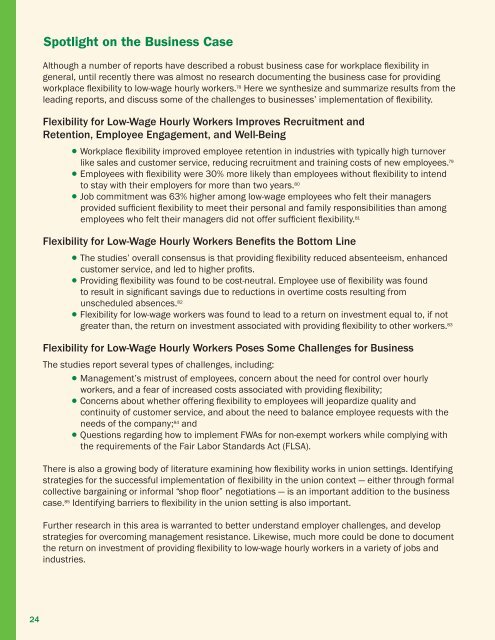Flexible Workplace Solutions for Low-Wage Hourly Workers
Flexible Workplace Solutions for Low-Wage Hourly Workers
Flexible Workplace Solutions for Low-Wage Hourly Workers
Create successful ePaper yourself
Turn your PDF publications into a flip-book with our unique Google optimized e-Paper software.
Spotlight on the Business Case<br />
Although a number of reports have described a robust business case <strong>for</strong> workplace fl exibility in<br />
general, until recently there was almost no research documenting the business case <strong>for</strong> providing<br />
workplace fl exibility to low-wage hourly workers. 78 Here we synthesize and summarize results from the<br />
leading reports, and discuss some of the challenges to businesses’ implementation of fl exibility.<br />
Flexibility <strong>for</strong> <strong>Low</strong>-<strong>Wage</strong> <strong>Hourly</strong> <strong>Workers</strong> Improves Recruitment and<br />
Retention, Employee Engagement, and Well-Being<br />
● <strong>Workplace</strong> fl exibility improved employee retention in industries with typically high turnover<br />
like sales and customer service, reducing recruitment and training costs of new employees. 79<br />
● Employees with fl exibility were 30% more likely than employees without fl exibility to intend<br />
to stay with their employers <strong>for</strong> more than two years. 80<br />
● Job commitment was 63% higher among low-wage employees who felt their managers<br />
provided suffi cient fl exibility to meet their personal and family responsibilities than among<br />
employees who felt their managers did not offer suffi cient fl exibility. 81<br />
Flexibility <strong>for</strong> <strong>Low</strong>-<strong>Wage</strong> <strong>Hourly</strong> <strong>Workers</strong> Benefits the Bottom Line<br />
● The studies’ overall consensus is that providing fl exibility reduced absenteeism, enhanced<br />
customer service, and led to higher profi ts.<br />
● Providing fl exibility was found to be cost-neutral. Employee use of fl exibility was found<br />
to result in signifi cant savings due to reductions in overtime costs resulting from<br />
unscheduled absences. 82<br />
● Flexibility <strong>for</strong> low-wage workers was found to lead to a return on investment equal to, if not<br />
greater than, the return on investment associated with providing fl exibility to other workers. 83<br />
Flexibility <strong>for</strong> <strong>Low</strong>-<strong>Wage</strong> <strong>Hourly</strong> <strong>Workers</strong> Poses Some Challenges <strong>for</strong> Business<br />
The studies report several types of challenges, including:<br />
● Management’s mistrust of employees, concern about the need <strong>for</strong> control over hourly<br />
workers, and a fear of increased costs associated with providing fl exibility;<br />
● Concerns about whether offering fl exibility to employees will jeopardize quality and<br />
continuity of customer service, and about the need to balance employee requests with the<br />
needs of the company; 84 and<br />
● Questions regarding how to implement FWAs <strong>for</strong> non-exempt workers while complying with<br />
the requirements of the Fair Labor Standards Act (FLSA).<br />
There is also a growing body of literature examining how fl exibility works in union settings. Identifying<br />
strategies <strong>for</strong> the successful implementation of fl exibility in the union context — either through <strong>for</strong>mal<br />
collective bargaining or in<strong>for</strong>mal “shop fl oor” negotiations — is an important addition to the business<br />
case. 85 Identifying barriers to fl exibility in the union setting is also important.<br />
Further research in this area is warranted to better understand employer challenges, and develop<br />
strategies <strong>for</strong> overcoming management resistance. Likewise, much more could be done to document<br />
the return on investment of providing fl exibility to low-wage hourly workers in a variety of jobs and<br />
industries.<br />
24

















